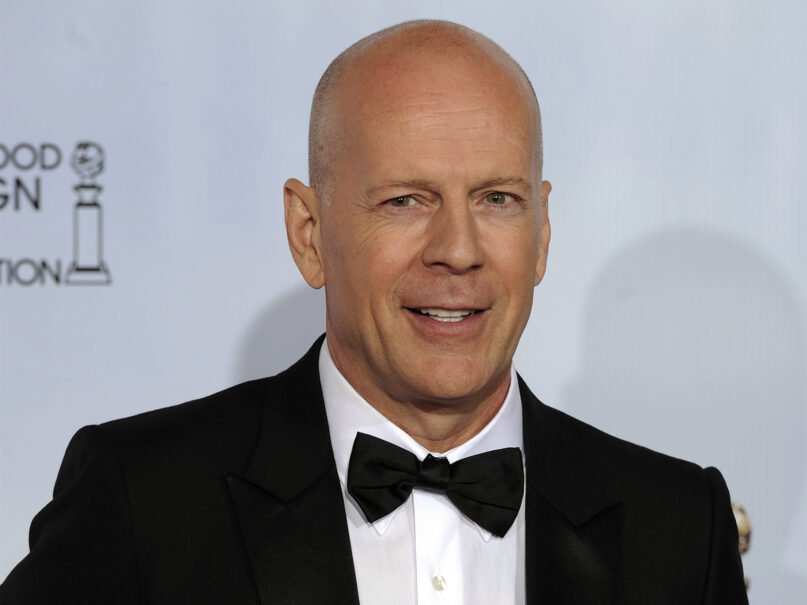(RNS) — For me, Bruce Willis will always be the wisecracking co-star, with Cybill Shepherd, of television’s “Moonlighting.” Or the prizefighter fleeing from his manager in “Pulp Fiction.”
Or, most memorably for me, police detective John McClane in the “Die Hard” series, which I never tire of watching.
But this week, we learned Bruce Willis is facing a far more formidable foe than even Hans Gruber.
Bruce Willis is now battling frontotemporal dementia, a neurodegenerative cognitive impairment that has symptoms that include changes in behavior, communication and language. It has neither treatment nor cure.
As his family wrote: “Bruce has always found joy in life, and has helped everyone he knows to do the same. Your continued compassion, understanding, and respect will enable us to help Bruce live as full a life as possible.”
In The New York Times, Patti Davis, the daughter of the late President Ronald Reagan, reflects on the bravery of that announcement. She recalls her own father’s admission, in 1994, that he had been diagnosed with Alzheimer’s. He signed off with these words: “I now begin the journey that will lead me into the sunset of my life.”
For my entire career, I have seen how the various forms of dementia have affected patients and their families. I have seen how it has affected esteemed colleagues and scholars — the story at the Shabbat table, repeated three times in the course of a few minutes, and the sad glances of others, knowing what has begun.
I have seen people I love disappear, slowly.
As a rabbi, what wisdom do I bring with me to these encounters with fragility and finitude?
The first teaching: About 30 years ago, when I was a young rabbi, I attended a rabbinic conference. At the end of the conference, one of the oldest rabbis rose to deliver the final benediction. It started out great, but he did not know when to stop. Slowly, what had started as an elegant statement became absurd.
At first, my colleagues and I stood there and listened. But, as the minutes dragged on, many of us began to fidget. Some of us began to grimace and/or giggle. The whole experience had become uncomfortable for everyone, until finally, the old rabbi was politely moved off the podium.
As we started to walk away, one rabbi came over to me and said: “Jeff, don’t forget what happened to the shattered pieces of the Tablets of the covenant.”
He was referring to the story of the golden calf in the Book of Exodus. When Moses saw the Israelites worshipping the idol, he broke the Tablets of the covenant, and he and God collaborated on crafting a new set of Tablets, representing the renewal of the covenant.
The ancient sages asked: What happened to the first set of tablets, which were broken?
The Talmud (Berachot 8b) puts it this way:
Rabbi Joshua ben Levi said to his children: Take care to respect an old man who through unavoidable circumstances has forgotten what he knew, for Scripture says that both the whole Tablets and the shattered Tablets were placed in the Ark.
It is one of the most moving images in rabbinic literature: the comparison of an elderly sage, perhaps struggling with dementia, to the broken Tablets.
Notice, please: Joshua ben Levi imparts this teaching not to a crowd of nameless students, and not as an academic exercise.
He spoke those words to his own children. Perhaps he was preparing them for what he believed would be either inevitable or likely.
The second teaching: Judaism places the mitzvah of honoring one’s parents at the very center of its moral core.
But here is something interesting. When the ancient sages chose a character who exemplified that virtue, they did not choose a Jew.
Instead, they chose a gentile named Dama ben Netinah, who was the city council president of Ashkelon in the first century of the Common Era.
From the Talmud (Avodah Zarah 23b):
Rav Abbahu said: Rabbi Eliezer the Great was asked by his disciples: “Can you give an example of real honoring of parents?”
He replied: “Go and see what Dama the son of Netinah of Ashkelon did. His mother was mentally afflicted and she used to slap him in the presence of his colleagues, and all that he would say was: ‘Mother, it is enough (dayeich immi)!’”
Here we have a tragedy — a story so poignant that everyone can relate to it, a story that is timeless in its ability to transcend the generations and to speak to our inner lives.
We can understand Dama’s pain and frustration. His mother has humiliated him in the presence of his colleagues, but she has humiliated herself more — and it wasn’t her fault.
We can imagine Dama’s internal pain. We can imagine him saying to himself: “This woman who is abusing me, she used to be my mother. She used to be a beautiful woman who nurtured me and cared for me. When I was an infant, she would clean me and now I have to clean her. She has hit me. My dignity will heal itself within a few seconds, but this illness has come and utterly and permanently robbed her of her dignity.”
For those of us of a certain age, Bruce Willis’ situation touches something very deep and very raw within us. Bruce Willis and I are the same age. We look at what he and his loved ones are experiencing, and we feel it — deeply.
It will, by no means, be easy. It will be very difficult.
My prayer: May Bruce maintain as much of his dignity as is humanly possible. May he always know he is made in the Divine Image. May he always feel God’s love, and the love of those who care about him. May God give them strength, patience and love.
Let us always remember that we carry the intact Tablets and the shards of the broken tablets together.






